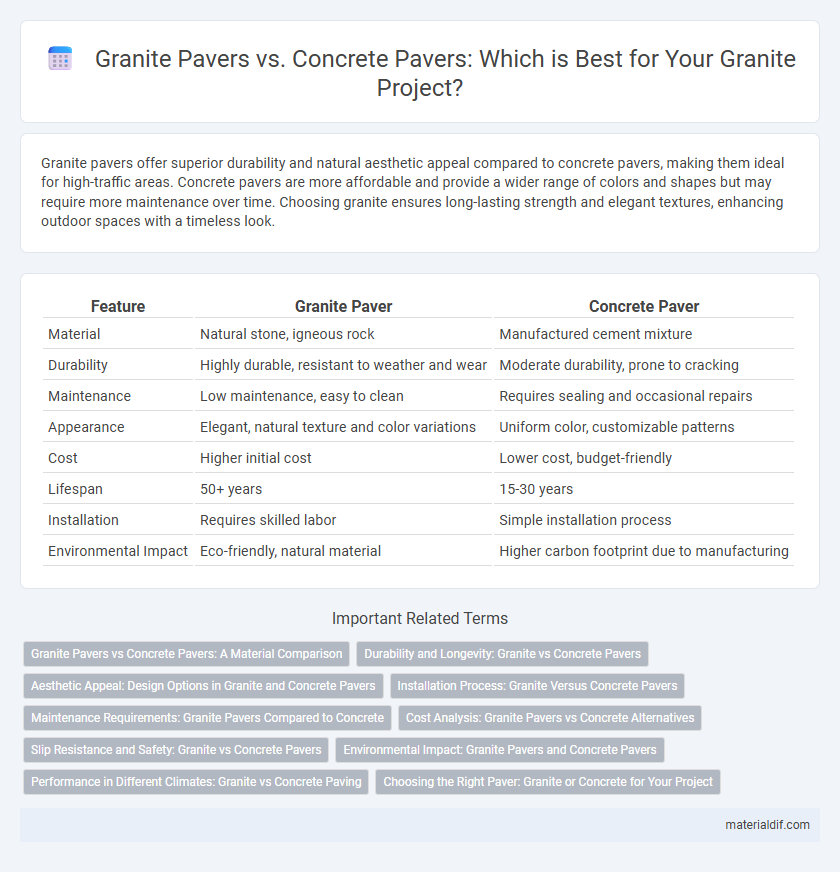Granite pavers offer superior durability and natural aesthetic appeal compared to concrete pavers, making them ideal for high-traffic areas. Concrete pavers are more affordable and provide a wider range of colors and shapes but may require more maintenance over time. Choosing granite ensures long-lasting strength and elegant textures, enhancing outdoor spaces with a timeless look.
Table of Comparison
| Feature | Granite Paver | Concrete Paver |
|---|---|---|
| Material | Natural stone, igneous rock | Manufactured cement mixture |
| Durability | Highly durable, resistant to weather and wear | Moderate durability, prone to cracking |
| Maintenance | Low maintenance, easy to clean | Requires sealing and occasional repairs |
| Appearance | Elegant, natural texture and color variations | Uniform color, customizable patterns |
| Cost | Higher initial cost | Lower cost, budget-friendly |
| Lifespan | 50+ years | 15-30 years |
| Installation | Requires skilled labor | Simple installation process |
| Environmental Impact | Eco-friendly, natural material | Higher carbon footprint due to manufacturing |
Granite Pavers vs Concrete Pavers: A Material Comparison
Granite pavers offer superior durability and natural aesthetics due to their dense, igneous composition, making them resistant to wear and weathering compared to concrete pavers, which may crack over time under heavy load. The high compressive strength of granite, typically around 130-240 MPa, surpasses that of concrete pavers averaging 20-40 MPa, ensuring longer lifespan and minimal maintenance. While granite pavers command a higher upfront cost, their resistance to staining, fading, and erosion justifies the investment for premium outdoor paving solutions.
Durability and Longevity: Granite vs Concrete Pavers
Granite pavers offer exceptional durability due to their natural stone composition, resisting wear, weathering, and heavy loads far better than concrete pavers. Concrete pavers, although cost-effective, are prone to cracking, chipping, and color fading over time, especially under harsh environmental conditions. The inherent hardness and density of granite ensure a longer lifespan, making it a superior choice for high-traffic outdoor surfaces requiring lasting strength and minimal maintenance.
Aesthetic Appeal: Design Options in Granite and Concrete Pavers
Granite pavers offer a natural, timeless aesthetic with a rich variety of colors and textures that enhance outdoor spaces with unique, organic patterns. Concrete pavers provide versatile design options through customizable shapes, colors, and finishes, allowing for complex patterns and contemporary looks. Both materials accommodate diverse landscaping styles, but granite excels in durability and natural beauty, while concrete allows more flexibility in design creativity.
Installation Process: Granite Versus Concrete Pavers
Granite pavers require precise cutting and skilled labor for installation due to their hardness and irregular shapes, often resulting in longer setup times compared to concrete pavers. Concrete pavers offer uniformity and ease of installation, as they are typically molded into consistent shapes that fit together seamlessly, reducing labor costs. The durability of granite pavers ensures long-term stability, while concrete pavers may need additional base preparation to prevent shifting in high-traffic areas.
Maintenance Requirements: Granite Pavers Compared to Concrete
Granite pavers require minimal maintenance due to their natural durability and resistance to staining, fading, and cracking, making them ideal for high-traffic areas. In contrast, concrete pavers often need regular sealing and can be prone to chipping and discoloration over time. The dense composition of granite also reduces weed growth and erosion, significantly lowering upkeep efforts compared to concrete alternatives.
Cost Analysis: Granite Pavers vs Concrete Alternatives
Granite pavers typically cost between $15 to $30 per square foot, reflecting their durability and premium aesthetic, while concrete pavers range from $6 to $12 per square foot, offering a more budget-friendly option. The higher initial investment in granite can be offset by its longevity, with a lifespan exceeding 50 years compared to concrete's 25 to 30 years under similar conditions. Maintenance costs for granite remain relatively low due to its natural resistance to weathering and stains, whereas concrete pavers may require more frequent sealing and repairs, impacting long-term expenses.
Slip Resistance and Safety: Granite vs Concrete Pavers
Granite pavers offer superior slip resistance due to their natural textured surface, making them safer for wet or high-traffic areas compared to concrete pavers, which can become slippery when smooth or polished. The inherent durability and non-porous nature of granite reduce the risk of algae and mold buildup, further enhancing safety. Concrete pavers often require additional treatments or coatings to improve traction, whereas granite maintains consistent slip resistance over time.
Environmental Impact: Granite Pavers and Concrete Pavers
Granite pavers are a natural stone product, offering high durability and minimal chemical processing which results in a lower environmental footprint compared to concrete pavers. Concrete pavers require significant energy consumption during cement production and emit higher levels of CO2, contributing to greater environmental impact. The longevity and recyclability of granite pavers make them a more sustainable choice for eco-conscious construction projects.
Performance in Different Climates: Granite vs Concrete Paving
Granite pavers exhibit superior durability and resistance to extreme weather conditions compared to concrete pavers, making them ideal for regions with fluctuating temperatures and heavy rainfall. Their natural composition allows better thermal stability, reducing the risk of cracking and erosion in freeze-thaw cycles. Concrete pavers, while cost-effective, often require sealing and maintenance to withstand harsh climates, limiting their long-term performance and lifespan.
Choosing the Right Paver: Granite or Concrete for Your Project
Granite pavers offer superior durability, natural beauty, and resistance to weathering, making them ideal for high-traffic outdoor spaces with a desire for a premium appearance. Concrete pavers provide a more cost-effective solution with versatile design options and ease of installation, suited for budget-conscious projects requiring quick turnaround. Evaluating factors such as project budget, aesthetic preference, longevity, and maintenance needs helps determine whether granite or concrete pavers are the optimal choice for your landscape or hardscape project.
Granite Paver vs Concrete Paver Infographic

 materialdif.com
materialdif.com